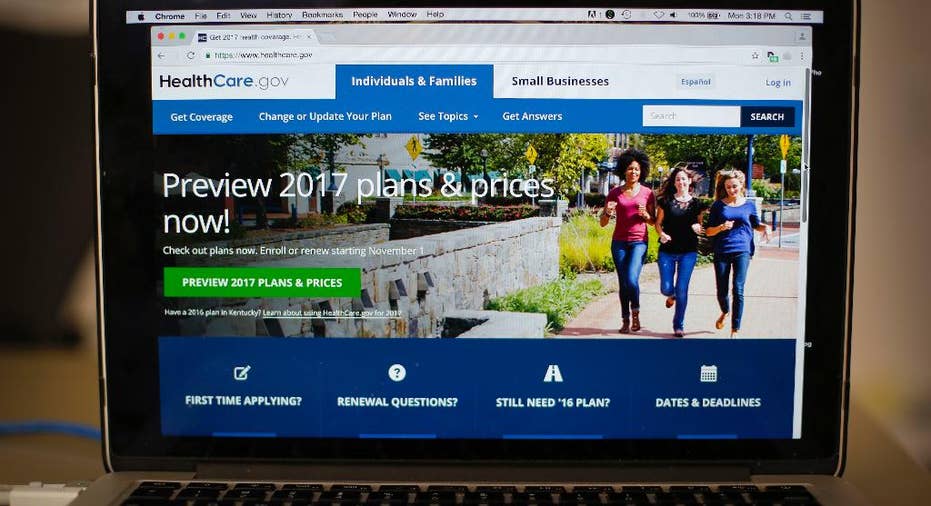President-elect Trump means angst for 'Obamacare' consumers

WASHINGTON – Donald Trump's election ushers in a time of high anxiety for people with health insurance under President Barack Obama's law, which expanded coverage to millions but has struggled to find widespread public acceptance.
While repeal now seems likely, that may take Congress months. A replacement for the 2010 health care law could take even longer, and may retain some of its features. Republicans are saying they want to protect people who now are covered from losing health care in the shift. While Congress labors, look for the Trump administration to use its regulatory powers to make changes.
Voters "don't want Washington to fix Obamacare, they want to make health care affordable," said House Ways and Means Chairman Kevin Brady, R-Texas, whose committee oversees much of health care. "I'm confident we will have more truly affordable health care for just as many Americans."
"It's our goal to dismantle Obamacare and actually focus on lowering the cost of coverage for people," said Sen. John Barrasso, R-Wyo., a member of the Republican leadership. "It's a commitment on behalf of Congress and the president-elect to get this done."
The rhetoric may sound familiar, but the circumstances couldn't be more different. Up until now, repeated Republican attempts to repeal the Affordable Care Act have been practice runs. This will be real, and so will the consequences. Trump will have a four-year term in the White House, but Congress faces the voters again in two years.
With HealthCare.gov's sign-up season underway, there's little chance the program will come to a crashing halt. Still, that's not very reassuring for people like Lodiza LePore of Bennington, Vermont, a photographer who pays about $80 a month for her policy. The coverage is skimpy, she says, but it's there if she has a health problem.
"I think they are just going to destroy everything Obama has done, and that's going to leave a lot of people with no health care," said LePore. "It's going to turn this country into a Third World country."
As many as 30 million people could be affected. Most directly hit would be some 10 million who like LePore have private coverage through the law's subsidized markets, and about 9 million covered under its Medicaid expansion. Another 5 million to 9 million people who buy individual policies outside the health law markets are exposed to its ups and downs.
Republicans don't want to make millions uninsured, said Mike Leavitt, Health and Human Services secretary for former President George W. Bush. "There is a widely held aspiration that people have health insurance, and that the solution isn't simply to say that it's OK if some people don't," he said.
Can they deliver? There's no final GOP plan and no decisions have been made. But here's a look at some of the major pieces in a complex puzzle:
___
REPEAL: THE 'EASY' PART?
Republicans don't have 60 votes in the Senate, so to pass a repeal bill they would have to use special budget-related procedures that allow a simple majority to work its will. There's a template for that in the GOP repeal bill that Obama vetoed this year. Trump would sign it.
But using the special procedures means Congress must first pass a budget, which can take several months. Going that route also would leave in place parts of the health care law that are not related to the budget.
Congress may delay the effective date of a repeal law to give it time to pass a replacement for the ACA.
___
REPLACE: A CHANCE FOR BIPARTISANSHIP?
"Obamacare's" requirement that individuals get insurance or face fines doesn't stand a chance, but other provisions would likely survive in a replacement bill. That includes keeping young adults on parental plans until age 26 and doing away with lifetime dollar limits on coverage.
Republicans also want to avoid a return to the days when people were denied coverage because of medical problems. They would protect those who maintain "continuous" coverage and fund "high-risk" insurance pools for patients who fall through the cracks.
House Speaker Paul Ryan has proposed tax credits to help people buy health insurance.
Republicans and Democrats may also be able to find common ground on dealing with the health law's Medicaid expansion, which a number of GOP-led states have adopted. "Medicaid is going to be the crucial issue," said GOP economist Douglas Holtz-Eakin. "There is a practical political reality there."
Democrats are going to be striving to keep as many people covered as possible.
A replacement bill could take a couple of years to hash out.
___
TRUMP UNILATERAL
While Congress labors away, expect the Trump administration to take administrative and regulatory actions to chip away at his predecessor's signature law, or reshape it.
Those could include making it harder for people to sign up for coverage outside of open-enrollment season, supporting legislation that would waive tax penalties for uninsured people in communities with no choice of insurers, or even supporting a lawsuit by GOP lawmakers that challenges some of the law's subsidies.
___
'POTTERY BARN' RULE
The old retail store rule is "if you break it, you buy it." The same applies to health care. Obama and the Democrats have paid a political price for trying to fix the problems of the uninsured and having some of those fixes generate their own complications.
The same could happen to Republicans if they're not careful.
"If people get mad at you, they will find a way to get you," said GOP economist Gail Wilensky, a former Medicare administrator. "If you really miss the mark of where the people are, they will get you."
___
This story has been corrected to say that Rep. Kevin Brady is from Texas, not California.



















